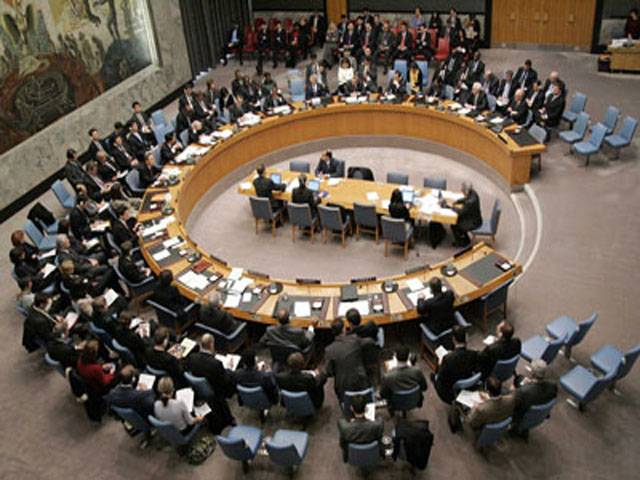UNITED NATIONS : The UN Security Council has brandished the threat of sanctions against South Sudan government forces and rebels responsible for escalating abuses in a worsening civil war.
In a strongly-worded statement, the 15 Council members “expressed horror and anger” over the killings of hundreds of people last week in the oil town of Bentiu - ethnic slaughter which UN officials have blamed on rebels.
The Council demanded an end to “all human rights violations and abuses” and said it was ready to “consider appropriate measures against those responsible” - an allusion to possible sanctions against both sides in a conflict that has killed thousands.
It demanded that the govt of President Salva Kiir - whose forces have been locked in battle for four months with rebels loyal to sacked vice president Riek Machar - protect civilians and investigate abuse claims.
The Council called on Kiir and Machar to “demonstrate leadership by publicly stating that any and all attacks on civilians are unacceptable,” to commit to punishing those responsible for the violence and to return to the negotiating table.
- Rebels say oil fields in reach -
On the ground in South Sudan, the world’s youngest nation, the embattled UN mission, UNMISS, condemned “in the strongest possible terms” an attack by unidentified gunmen on a convoy of barges carrying vital food aid. It said four crew members and peacekeepers were wounded.
Rebels said they were closing in on key oil fields and two state capitals, predicting that government forces would soon fall.
A spokesman for the rebels, General Lul Ruai Koang, said they had captured the town of Renk, close to the border with Sudan, on Wednesday and were advancing on the Paloich oil fields.
“The fall of Renk... leaves government troops trapped in Malakal with no supply and escape routes,” he said in a statement, referring to the strategic capital of Upper Nile state, which has already changed hands several times in the conflict.
The rebel claims could not be independently confirmed, and the government’s army spokesman dismissed them as “a big lie.”
South Sudan has been locked in civil war since December 15, when a clash between members of the presidential guard split the army and spiraled into countrywide fighting.
The war has left thousands and possibly tens of thousands of people dead, and forced over one million to flee their homes. Violence has also taken on an ethnic dimension, pitting Kiir’s Dinka tribe against militia forces from Machar’s Nuer people.
On Thursday, South Sudan said it was dropping charges against four alleged top rebels on trial for attempting to overthrow the government, in an apparent effort to promote peace.
But Justice Minister Paulion Wanawilla said charges against Machar remained in place.
Both sides have been implicated in atrocities and war crimes. Last week, the rebels were blamed for the killings in Bentiu, and a pro-government mob killed dozens of civilians in an attack on a UN base in Bor where they were sheltering.
The Council called on the office of UN human rights chief Navi Pillay to launch an investigation into the killings in Bentiu, the capital of oil-rich Unity state.
UNMISS said Monday that both South Sudanese and Sudanese - some from Sudan’s Darfur region - were killed in “targeted killings” after rebels took Bentiu.
More than 200 civilians were reportedly killed in the main mosque alone, UNMISS said.
In Khartoum, the Sudanese government called for an investigation into what it called the “assassination” of its nationals.
Foreign ministry spokesman Abubakr al-Siddiq told AFP it was not yet clear how many of the victims were Sudanese.
“Let us say dozens,” he said, adding Khartoum was in contact with the UN over the incident - one of the worst reported atrocities since fighting erupted in South Sudan.
South Sudan became independent from Khartoum less than three years ago.
“The world’s newest state is clearly on a precipice,” said the US ambassador to the UN, Samantha Power.
“South Sudan’s leaders must take immediate steps to end the violence and participate in political talks to resolve the conflict,” she said, warning that an “even more devastating humanitarian catastrophe” could unfold should they fail to act.
Saturday, April 20, 2024
UN Council threatens curbs over South Sudan violence

Caption: UN Council threatens curbs over South Sudan violence
Policitising Tragedy
April 20, 2024
Tehran to Rafah
April 20, 2024
A New Leaf
April 20, 2024
A Tense Neighbourhood
April 19, 2024
Dubai Underwater
April 19, 2024
Dangers of Deepfakes
April 20, 2024
Feudalism
April 20, 2024
Kite tragedy
April 19, 2024
Discipline dilemma
April 19, 2024
Urgent plea
April 19, 2024
ePaper - Nawaiwaqt
Advertisement
Nawaiwaqt Group | Copyright © 2024





